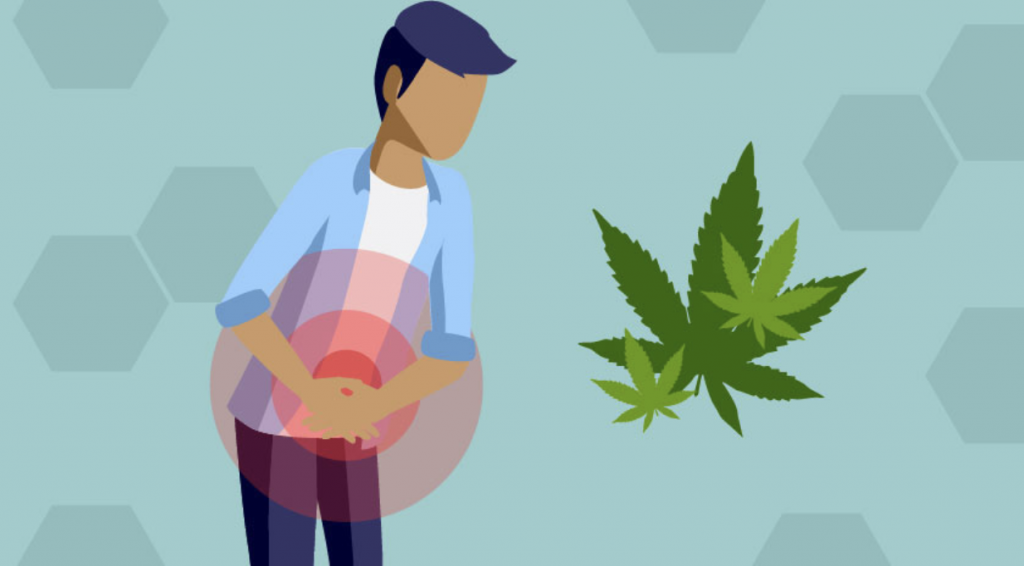
Inflammatory bowel disease (IBD) is a general term used to describe a group of disease conditions that involve chronic inflammation of the digestive tract. The exact pathophysiology of inflammatory bowel disease has not yet been fully established but appears to involve an inflammatory response with a dysregulated immune system.
Diet and stress were suspected to be the cause, but doctors now know that these factors only aggravate the condition. A possible cause of IBD can be an immune system malfunction. When your immune system tries to fight off invading viruses or bacteria in the digestive tract, an abnormal immune response can lead to the attack of the normal cells of the digestive tract.
If you are interested in getting your medical marijuana recommendation please feel free to sign up on FadeMD and schedule a time to speak with a licensed medical practitioner. Before we talk about how medical marijuana can help with inflammatory bowel disease and how to get your medical marijuana recommendation and mmj card online, we will discuss the types of IBD and symptoms.
What are the types of IBD?
The two most common types of IBD are Ulcerative colitis and Crohn’s disease
Ulcerative colitis – this condition causes inflammation and sores (ulcers) along the outer lining of the large intestines (colon) and rectum.
Crohn’s disease – this condition causes pain and swelling in the digestive tract. It can affect any part of the digestive tract starting from the mouth to the anus but the most affected part is the small intestine. The inflammation may also involve the deeper layers of the digestive tract.
What are the risk factors for IBD?
- Age – IBD can be seen at any age but in most cases, it is diagnosed before the age of 30. Though some people don’t develop the disease until they are in their 50s and 60s.
- Gender – Men and women have an equal predilection to IBD
- Family history and Genetics – you are at high risk of developing IBD if you have a close relative such as a parent, sibling, or child with IBD. Scientists also believe that this disease condition may have a genetic component.
- Environmental factors – people who live in urban areas and industrialized countries tend to have a higher risk of developing IBD. Research have revealed that residents of industrialized areas eat more fats and processed foods which is related to the development of IBD. IBD is also common among people living in northern climates where it is often cold. A sedentary lifestyle has been found to increase the risk of IBD.
- Drugs – ingestion of Non-steroidal anti-inflammatory drugs such as Diclofenac, Naproxen, Ibuprofen, and others may increase the risk of developing IBD or even worsen the disease in people who already have IBD.
What are the presenting symptoms of IBD?
The symptoms vary with the type of the IBD; whether it is Ulcerative colitis or Crohn’s disease. It may also be mild or severe and may appear suddenly or come in a gradual manner. You may have periods of active illness which is then followed by periods of remission. The signs and symptoms that are common to both types of IBD includes;
- Diarrhea, which occurs when the affected parts of the bowel cannot absorb water again.
- Abdominal pain, cramping, and bloating due to bowel obstruction.
- Unintended weight loss, which may cause delayed growth and development.
- Blood in the stool is probably from bleeding ulcers
- Other symptoms include fever, fatigue, joint pain, nausea and vomiting, skin rashes and sores.
How does medical cannabis help in IBD?
Generally, conventional therapies aimed at induction and remission of Inflammatory Bowel Disease mainly work through immune suppression and they consist of antibiotics, steroids, and biologic therapies.
Cannabis sativa has been used in medicinal practice for thousands of years. Its use has been beneficial in the treatment of various health-related problems including symptoms related to multiple sclerosis, chronic intractable pain, dystonic movement disorder, and epilepsy in patients with AIDS or cancer. In gastroenterology, medical cannabis is used to treat emesis, abdominal pain, diarrhea and intestinal inflammation. This plant contains more than 70 compounds but THC CBD remains the two most active substances from the cannabis plant.
Both THC and CBD acts on the Endogenous Cannabinoid System (ECS) to produce various effects. The ECS has been found to be involved in the physiological control of colonic activity and in some pathophysiological states such as paralytic ileus, intestinal inflammation, and cholera toxin-induced diarrhea. The endogenous cannabinoid system consists of cannabinoids receptors (CB1 and CB2) on which these substances act on.
ECS is found in all vertebrates and humans and distributed among organs and tissues. CB1 receptors are majorly seen in the neurons of the central, peripheral, and enteric nervous systems while CB2 receptors are found mainly in immune cells. In the gastrointestinal tract, CB1 and CB2 receptors are found in all the layers of the intestinal wall, and activation of these receptors brings about a decrease in the inflammatory process.
Studies have shown that activation of CB1 receptors produces relaxation of the lower sphincter, inhibition of gastric motility and acid secretions as well as intestinal motility and secretions.
In a study of 319 patients with IBD, 91% of patients with IBD symptoms showed improvement with cannabis use; 83.9% reported improved abdominal pain, 76.8% indicated improved abdominal cramping, 48.2% had improved joint pain, and 28.6% reported improved diarrhea. Patients also believed that cannabis improved their general well-being, stress level, and sense of control over IBD.

How To Get Your Medical Marijuana Card Online
No matter what state you are in, the first step to get medical marijuana is to get your medical marijuana recommendation also called an mmj recommendation for medical marijuana certification. To do this you can sign up on FadeMD and talk to a licensed medical practitioner who can approve you for medical marijuana. Then depending on what state you are in you will have to complete a state application in order to get your state mmj card.
In Conclusion
CBD has been a major breakthrough drug in medical practice and it has been well applied in the treatment of various health conditions. IBD population has shown a significant improvement with the introduction of CBD as part of the drugs used in its management. A significant portion of IBD patients, particularly those with severe disease, use cannabis to relieve symptoms of pain, nausea, and appetite and to improve their overall mood.
Disclaimer: The information, including but not limited to, text, graphics, images and other material contained in this article are for informative purposes only. No material from this article is intended to be a substitute for professional medical advice, diagnosis, or treatment.
Always seek the advice of your physician or other qualified health care provider with any questions you may have regarding a medical condition or treatment before undertaking a new health care regimen. Never disregard professional medical advice or delay in seeking it because of something you have read on this website.
References:
https://www.ncbi.nlm.nih.gov/pmc/articles/PMC5193087/
https://www.healthline.com/health/inflammatory-bowel-disease
https://my.clevelandclinic.org/health/diseases/15587-inflammatory-bowel-disease-overview
